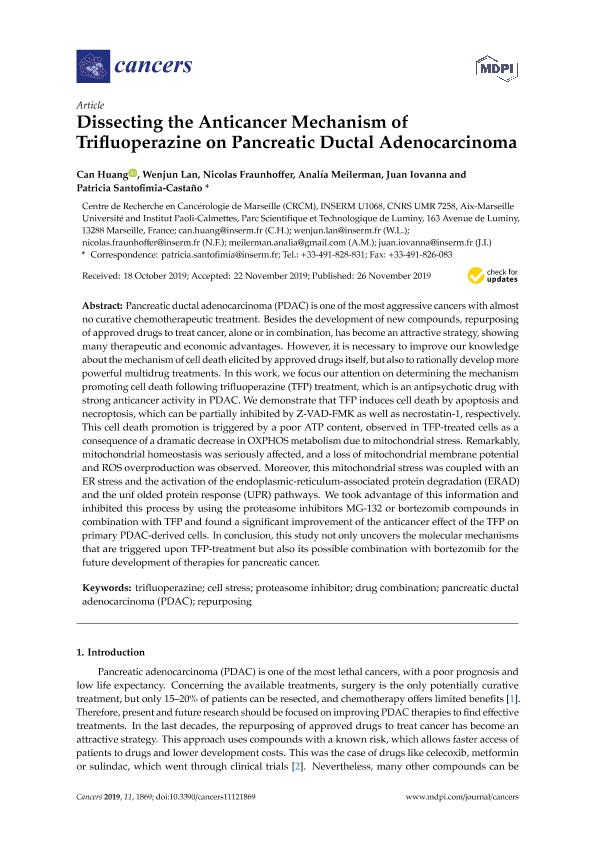Artículo
Dissecting the Anticancer Mechanism of Trifluoperazine on Pancreatic Ductal Adenocarcinoma
Huang, Can; Lan, Wenjun; Fraunhoffer Navarro, Nicolas Alejandro ; Meilerman, Analía; Iovanna, Juan Lucio; Santofimia Castaño, Patricia
; Meilerman, Analía; Iovanna, Juan Lucio; Santofimia Castaño, Patricia
 ; Meilerman, Analía; Iovanna, Juan Lucio; Santofimia Castaño, Patricia
; Meilerman, Analía; Iovanna, Juan Lucio; Santofimia Castaño, Patricia
Fecha de publicación:
11/2019
Editorial:
MDPI AG
Revista:
Cancers
ISSN:
2072-6694
Idioma:
Inglés
Tipo de recurso:
Artículo publicado
Clasificación temática:
Resumen
Pancreatic ductal adenocarcinoma (PDAC) is one of the most aggressive cancers with almost no curative chemotherapeutic treatment. Besides the development of new compounds, repurposing of approved drugs to treat cancer, alone or in combination, has become an attractive strategy, showing many therapeutic and economic advantages. However, it is necessary to improve our knowledge about the mechanism of cell death elicited by approved drugs itself, but also to rationally develop more powerful multidrug treatments. In this work, we focus our attention on determining the mechanism promoting cell death following trifluoperazine (TFP) treatment, which is an antipsychotic drug with strong anticancer activity in PDAC. We demonstrate that TFP induces cell death by apoptosis and necroptosis, which can be partially inhibited by Z-VAD-FMK as well as necrostatin-1, respectively. This cell death promotion is triggered by a poor ATP content, observed in TFP-treated cells as a consequence of a dramatic decrease in OXPHOS metabolism due to mitochondrial stress. Remarkably, mitochondrial homeostasis was seriously affected, and a loss of mitochondrial membrane potential and ROS overproduction was observed. Moreover, this mitochondrial stress was coupled with an ER stress and the activation of the endoplasmic-reticulum-associated protein degradation (ERAD) and the unf olded protein response (UPR) pathways. We took advantage of this information and inhibited this process by using the proteasome inhibitors MG-132 or bortezomib compounds in combination with TFP and found a significant improvement of the anticancer effect of the TFP on primary PDAC-derived cells. In conclusion, this study not only uncovers the molecular mechanisms that are triggered upon TFP-treatment but also its possible combination with bortezomib for the future development of therapies for pancreatic cancer.
Archivos asociados
Licencia
Identificadores
Colecciones
Articulos(CEFYBO)
Articulos de CENTRO DE ESTUDIOS FARMACOLOGICOS Y BOTANICOS
Articulos de CENTRO DE ESTUDIOS FARMACOLOGICOS Y BOTANICOS
Citación
Huang, Can; Lan, Wenjun; Fraunhoffer Navarro, Nicolas Alejandro; Meilerman, Analía; Iovanna, Juan Lucio; et al.; Dissecting the Anticancer Mechanism of Trifluoperazine on Pancreatic Ductal Adenocarcinoma; MDPI AG; Cancers; 11; 12; 11-2019; 1-15
Compartir
Altmétricas



